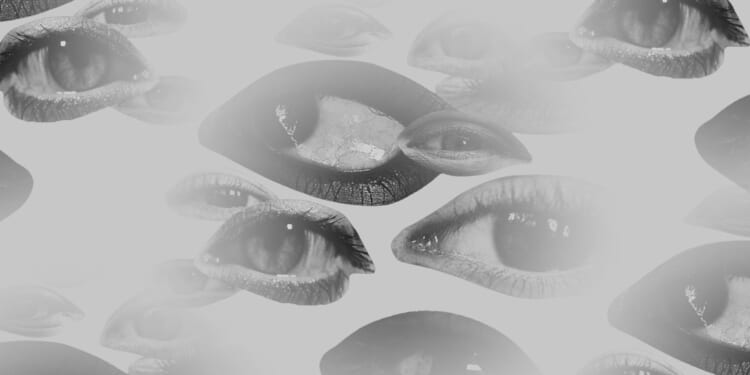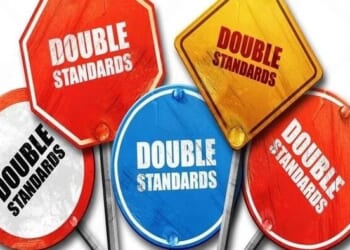You’re reading the G-File, Jonah Goldberg’s biweekly newsletter on politics and culture. If this was forwarded to you, sign up for the G-File here.
Dear Reader (including those newly concerned about the prospect of canine arson),
I have a rule of thumb. It’s not a credo or law, just a “when in doubt” sort of thing. The shorthand for it sometimes is, “Don’t look for trouble.” Sometimes it takes the form of a question: “Is it worth it?” The “it” is usually something that would be fun or cool if everything worked out just right. The “worth it” refers to whether it’s worth the risk if it goes wrong, multiplied by the odds of it going wrong.
When I read stories about people—usually young men—doing incredibly dangerous things for the momentary bragging rights or “glory” of pulling it off, I think about my little heuristic. For instance, there’s a tradition in Yellowstone to go “hot potting.” This is when you briefly jump into a thermal spring. The problem is not hard to guess. If you don’t do a little research, you can jump into the wrong cauldron. Or you can jump in the wrong spot and not be able to get out. Whatever. Some springwater can reach near-boiling temperatures, and you can very easily die. (In 2016, a young man died and was quickly liquified due to a mixture of the heat and acidic water.) Would it be cool to pull it off? Yup. Worth the risk? Nope.
I have a similar reaction to people posing with bears (especially cubs) or taking selfies on cliffs, radio towers, or skyscrapers. Indeed, in recent years, hundreds of people suffering from “selfie-syndrome” or “selfitis” have died because they didn’t follow my One Neat Trick. The selfie siren song was just too alluring.
We’ll come back to that in a bit. But first, I call your attention to my friend Charles Cooke’s own neat variant of the “Is it worth it?” rule of thumb. In “How Not to Be Caught Saying Hideous Things: A Primer,” Charlie offers a simple trick: “My strategy is that I don’t say those things in the first place.”
Now, Charlie implicitly acknowledges this is easier said than done, particularly if you actually believe the hideous things you’re saying. But he’s got a hack for that, too. “When practiced concurrently with another useful strategy — not believing any of those things in the first place — it is almost foolproof.”
The context for Charlie’s helpful advice should be familiar. Politico reported this week that leaders of the Young Republicans routinely said awful things in a group chat: variations of the n-word, gas chamber “jokes,” pronouncements on how “rape is epic,” chatter about how blacks are “monkeys,” and encomiums on the awesomeness of slavery.
About two weeks prior, Jay Jones, a Democratic candidate for Virginia attorney general, landed in hot water for texts and phone calls containing all manner of horrid endorsements of murder and cruelty.
And just yesterday, CNN reported that Maine Democratic senatorial candidate Graham Platner has said all manner of stupid things on Reddit denigrating rural white Americans—good thing there are none of them in Maine!—and describing himself as a communist (how many of them are in Maine is subject to debate).
Again, if they’d followed Charlie’s neat trick, all of these people would have fewer headaches.
But it’s worth noting that not all of these things are quite the same thing or equally vile. Platner’s posts were in a public forum, albeit under an apparently poorly concealed pseudonym. The Young Republicans chat was not quite public, but it wasn’t entirely private either. It was closer to a professional group text, with high-ranking members from around the country. And the Jones texts and phone call were actually private, a point many partisan critics elide in their denunciations. That’s not an excuse—he was texting and talking with a fellow member of the Virginia House of Delegates, who wasn’t a close friend but a colleague. It’s just to say he didn’t publicly call for the murder of someone’s children, he “merely” did it privately.
On privacy and the microcosm.
Privacy is a much more complicated and interesting concept than you might think. (The Stanford Encyclopedia of Philosophy chapter on privacy is a deep intellectual rabbit hole I’ve had to climb my way out of.)
One of my favorite quotes about privacy comes from Milan Kundera’s Testaments Betrayed, in a section dealing with the Jan Procházka scandal of the 1960s. There’s no reason you should have heard of the Czech writer and filmmaker or his scandal. But the gist is the communists secretly recorded Procházka’s conversations and then played edited versions of them on the radio to discredit him. He said terrible things on the tapes. The ploy worked initially, but over time, thanks in part to Kundera, people realized the greater crime was committed by the police state. Anyway, Kundera wrote:
In private, a person says all sorts of things, slurs friends, uses coarse language, acts silly, tells dirty jokes, repeats himself, makes a companion laugh by shocking him with outrageous talk, floats heretical ideas he’d never admit in public, and so forth. Of course, we all act like Prochazka, in private we bad-mouth our friends and use coarse language; that we act different in private than in public is everyone’s most conspicuous experience, it is the very ground of the life of the individual; curiously, this obvious fact remains unconscious, unacknowledged, forever obscured by lyrical dreams of the transparent glass house, it is rarely understood to be the value one must defend beyond all others. Thus only gradually did people realize (though their rage was all the greater) that the real scandal was not Prochazka’s daring talk but the rape of his life; they realized (as if by electric shock) that private and public are two essentially different worlds and that respect for that difference is the indispensable condition, the sine qua non, for a man to live free; that the curtain separating these two worlds is not to be tampered with, and that curtain-rippers are criminals.
Longtime readers (and listeners) know that I am a big fan of Friedrich Hayek’s concept of the “microcosm” and the “macrocosm” (though Hayek preferred the suffix –cosmos). The microcosm is the realm of family, friends, and community. People you know as real people. The macrocosm is the extended order, the realm of laws, contracts, commerce, strangers.
“Man’s instincts, which were fully developed long before Aristotle’s time,” Hayek writes in The Fatal Conceit, “were not made for the kinds of surroundings, and for the numbers, in which he now lives. They were adapted to life in the small roving bands or troops in which the human race and its immediate ancestors evolved during the few million years while the biological constitution of homo sapiens was still being formed.” In our evolutionary environment, we shared resources with our people and we fought over resources with others.
The challenge for modern humans, Hayek continues, is “that we must constantly adjust our lives, our thoughts and our emotions, in order to live simultaneously within different kinds of orders according to different rules.”
If we try to apply the reciprocity and mutual dependence of the microcosm to the macrocosm, “as our sentiments and sentimental yearnings often make us wish to do,” Hayek warns, “we would destroy it. Yet if we were always to apply the rules of the extended order to our more intimate groupings, we would crush them. So we must learn to live in two sorts of worlds at once.”
Now, I usually bring this up in the context of politics and political theory. Communism was one famous attempt to obliterate the line between the microcosm and the macrocosm. Nazism was another. That’s what totalitarianism is. Benito Mussolini, who coined the term, defined it as “everything within the state, nothing outside the state.”
But here’s the thing: There are other threats to privacy than some panopticon state. I’m not going to go on a rant about Big Tech, data mining, hacking, and all that. Though those are real issues.
The threat that I have in mind is not some external Orwellian state or some dystopian evil corporation. It’s internal. In us.
One thing that bothers me about these revelations of terrible things said in private conversations is how similar they sound to the terrible things said in public and on social media, podcasts, and TV every day. I’m not going to do Andy Dufresne and inchworm through the Shawshank sewer pipe that is social media today, but the simple fact is that people routinely scream just as evil and deceitful things for fun and profit every minute of the day.
The kinds of things one might say in private, to close friends, for shock value, as a joke, or out of a shared hateful anger at this group or that, are now welcome or at least tolerated in the public square. Bigotry has always existed and probably always will. Friends have always shared rage or wished violence on mutually hated people. But friends know how to calibrate the rage; they get the jokes, they understand that you’re not serious. And even when you are serious, to a point, it stays there. Now, I agree entirely with Charlie that one shouldn’t think or talk the way the Young Republicans punks or Jay Jones did. But when similar language is routinely used in the public square—for fun, clicks, or profit—it shouldn’t surprise us that weak-willed, poorly socialized, or otherwise unserious people will feel less inhibited to say slightly edgier stuff in private, because the line between what is acceptable to say in public and private is being constantly broken down.
When the test for a statement’s validity ceases to be “Is it true?” or “Is it decent?” and is instead “Will it get a reaction from people?” you shouldn’t be surprised if people lose the ability to discern truth or care about it all. Over time, for some, truth loses its real meaning. It becomes a misnomer because what people really mean is “something that gets attention” Candace Owens and similar gargoyles say terrible things about Jews, I suspect in no small part, because she thinks if Jews protest, it must be because she’s “on to something” It’s a moral universe where slander doesn’t exist because complaining about slander is treated like confirmation rather than rebuttal. There is no truth, so we’re all free to create whatever version of reality we want and we’ll just call that the truth until a more profitable narrative emerges.
But I’m getting distracted. Forget about the violence and bigotry for a moment. The culture is choked with people who curate their whole lives on social media. How many TV shows are dedicated to the proposition that you should behave grotesquely or outlandishly in “private” so long as the reality show cameras are running? “Tradwives” make a fortune pretending that the traditional role of women is to look like an underwear model and churn your own butter while someone points a camera at you. Young women plan trips built around taking selfies.
External threats to privacy are real. But the biggest threat to privacy is the widespread conviction that your private life is on display. That wouldn’t be so bad if your definition of “on display” was grounded in the God-fearing worry that He is watching you. But that’s not the definition people are using. It’s the idea that people are paying attention to you. And negative attention in this brave new world is better than no attention at all.
The internet seduces and entices people into talking to strangers as if they are friends. It commodifies and monetizes the shock value of saying what should be unsayable in public because the line between public and private is now a marshy swampland with no clear borders. Heap hatred on a shared enemy, and the people who like your tweet are virtual friends and the people who hate it are proof you were right to say it. This sorry state of affairs is only possible in a world where people have fewer and fewer actual friends. It is a world where we think virtual communities are actual communities. That shared hatred is a substitute for actual friendship, because allies in the virtual world are the best you’re going to get.
“That was very much me f–king around the internet,” Graham Platner told CNN. “I don’t want people to see me for who I was in my worst Internet comment—or even frankly who I was in my best Internet comment. … I don’t think any of that is indicative of who I am today, really.”
I’m willing to believe that. But his mistake was in thinking being a shmuck in a Reddit thread was the same thing as talking to friends at a bar. We live in an age where, for too many people, you are who you are on the internet (or TV or podcasts, etc), not who you are in real life—because the division between real life and the internet, between the microcosm and the macrocosm, is disappearing, not so much out there, but in our hearts.
Various & Sundry
Canine Update: One last point about the “news”letter that is relevant to the Canine Update. As I wrote this, I felt the twinge of hypocrisy lurking ahead. After all, I share a lot of my private life with readers. But I have boundaries. I’m not going to get all defensive here, instead I’ll just make a narrow point I’ve made before. I write and tweet about my dogs (and cat) a lot. But I don’t talk about my child. Because my child is at the center of my microcosm. And I want to keep it that way to protect her from all the cruelty and nonsense I know people want to visit on her to punish me (I do have some experience with this I won’t get into). Meanwhile, my dogs are also part of my microcosm, but they don’t give a rat’s ass about anything else. They have not been corrupted or influenced in the slightest by their internet fame. That’s one of the wonderful things about dogs, they’re the microcosm all the way down.
Okay, on with the important stuff. As some of you may recall, Pippa has been quite stubborn about sleeping in some mornings, resulting in me taking the Dingo out alone. They like this arrangement. More sleep for Pip, two walks for the Dingo. But the key to Pippa’s strategy lay in the fact that the intense negotiations to get her out of bed risked waking up the Fair Jessica. Well, Jessica is travelling with Lucy (aka “the human puppy”), so I can make as much noise as is required to get Pippa up. Zoë has been behaving a bit strangely lately, preferring to stay in the backyard for long stretches at a time. We don’t know why, but don’t think she’s ill as her appetite is fine and she is full of energy for all of her missions. Gracie, meanwhile, is becoming ever more insistent that she should be allowed to drink from the garden hose whenever she desires. She will stand by the back door and glare and meow at me until I go back there and turn on the spigot. It’s cute, but can be a pain, too. Speaking of pains, I am observing protocol and appeasing Chester every morning. Oh, and Clover is always entertaining.
My dear friend of nearly 30 years, Ramesh Ponnuru, is going through a rough patch. Please offer whatever prayers or support you can for Ramesh and his wonderful family.
The Dispawtch

Why I’m a Dispatch Member: I’ve been reading/listening to The Dispatch for a few years now, but finally became a subscriber recently and got a peek behind the curtain I’ve been missing out on (thank you to anyone who supports The Dispatch student subscriptions—it’s such a gift for this part-time Master’s student, full-time worker!). The current state of politics makes my head spin and my heart ache, but the fine people of The Dispatch, both writers and readers, remind me that sanity exists and there are many Americans still out there who stand by their principles.
Personal Details: While there’s much about current affairs of the U.S. that worry me, I take great comfort in the fact that we still have our great uniter: college football. I feel unironic hope for this country when I see people can still get passionate about something. For me, that’s Ohio State – O-H!
Pet’s Breed: Part husky, German Shepherd, Boxer, and probably a couple others mixed in there too.
Gotcha Story: I’d been wanting a dog for a few years, but the timing was never right until this summer. I met him at an adoption event, immediately fell in love, and began the dog mom life a couple weeks later!
Pet’s Likes: The dog park, swimming, hiking, camping, watching the world out the window, chasing smaller dogs around.
Pet’s Dislikes: Bikes, strollers, scooters, loud cars—basically anything and everything that’s common in city life (which unfortunately we live in).
Pet’s Proudest Moment: When he actually played with other dogs at the dog park for the first time. He was a bit of a scaredy cat when I first got him, but I love seeing him get more confident and playful as he gets older.
A Moment Someone (Wrongly) Accused Pet of Being Bad: When he had an accident on my parents’ couch while we were visiting—sorry guys!
Do you have a quadruped you’d like to nominate for Dispawtcher of the Week and catapult to stardom? Let us know about your pet by clicking here. Reminder: You must be a Dispatch member to participate.
















